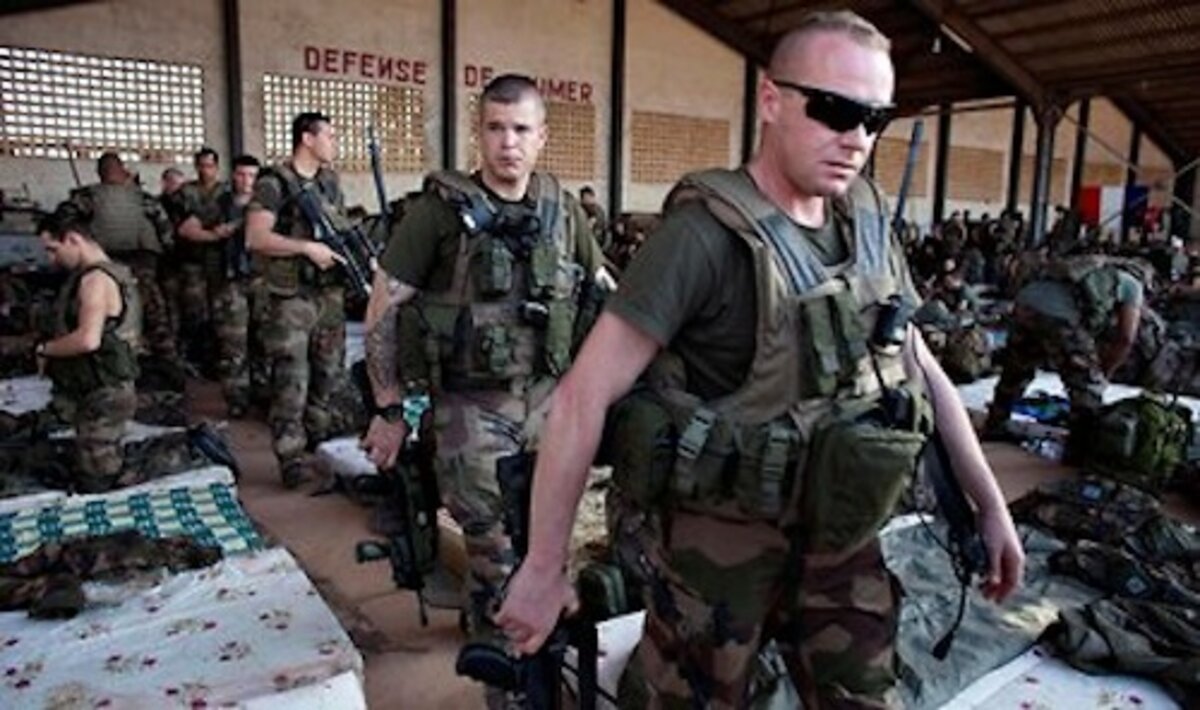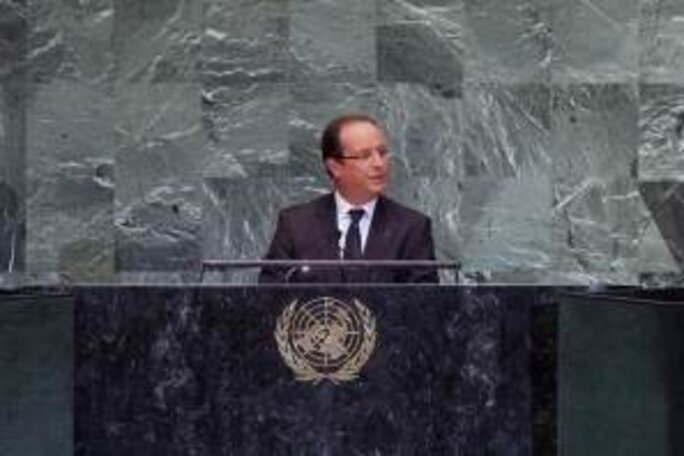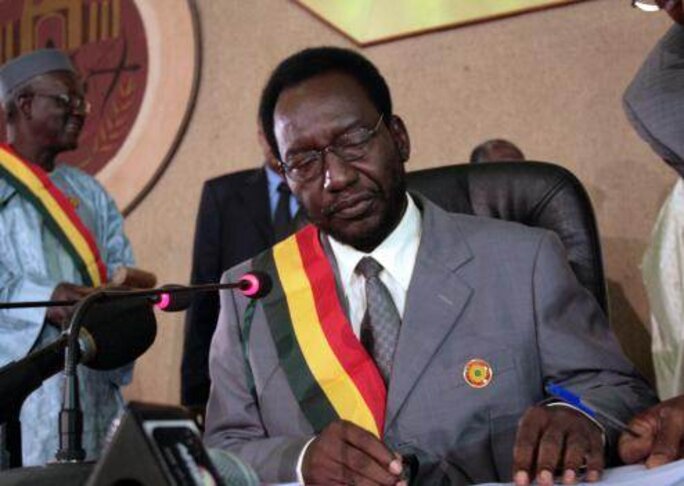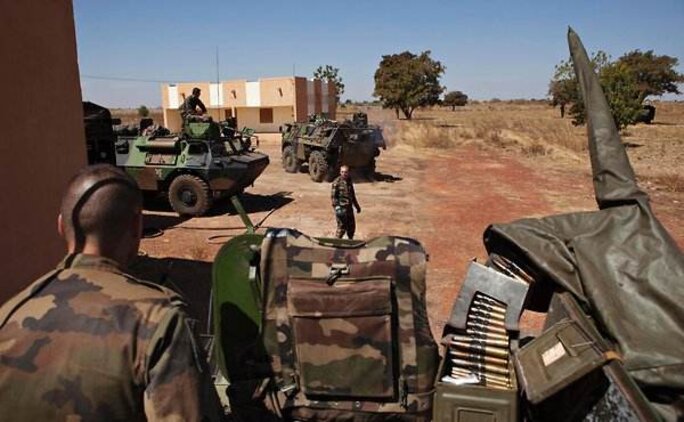President François Hollande has just become involved in a large-scale war in Mali. Already some 800 French troops are on the ground in the African country, with the number expected to increase to 2,500 in the coming days and weeks. Meanwhile French aircraft have been carrying out attacks across the country. President Hollande sent in the troops last Friday, January 11th, after Mali's interim president made an urgent plea for help as Islamic rebels headed towards the country's capital. However, as Mediapart's editor François Bonnet argues below, the intervention has taken place in an impromptu manner, with shifting objectives, an unclear timetable and after having deliberately ignored the complex processes of political negotiations. As a result, he says, France finds itself alone without its European allies in a country that has completely fallen apart.
---------------------------------------------
Operation Serval, as France's intervention in Mali is known in military parlance, is into its sixth day. So now is a good time to take stock of what François Hollande has done. It is a large-scale war that France has just committed itself to in the Sahel region of Africa and not simply a military intervention restricted to limited and quickly attainable objectives. France, the former colonial power, is entering Mali in force. Fighter-bomber aircraft, helicopters, armoured vehicles, special forces and intelligence agents are on the scene and in the days to come a force of 2,500 men will be committed on the ground and will engage in combat. Contrary to what François Hollande said during his election campaign early last year, France is indeed behaving as the “gendarme of Africa” (1) and is in fact going even further...

By now the war has found its own tempo and has already gone beyond all the limited parameters that were originally announced. We have moved a long way past the pleasant declarations made about Mali in recent times. For example on December 24th the defence minister Jean-Yves Le Drian announced in an interview with Le Croix newspaper that France would not get involved in fighting and that there would be a “European contingent of 400 men” who would train the Malian army, while the forces of the Economic Community Of West African States (ECOWAS) would take charge of the rest.
Instead France has rushed headlong into precisely the opposite scenario. Almost by stealth and without prior debate, France has at a stroke heavily committed itself to a war that will, says the president of the Republic, “last as long as necessary”. On top of this absence of a timetable there are also huge unknowns in relation to the main parameters that dictate any conflict.
1. The objectives. On Friday January 11th when the operation was launched President Hollande highlighted the need to block the sudden advances of “the terrorists” towards the south of Mali. It was portrayed as only a limited intervention aimed at maintaining the status quo on the ground while awaiting the development of the many diplomatic initiatives under way. Yet the war aim has already changed. Now it is about “re-establishing the territorial integrity of Mali”, the French head of state said on Tuesday January 15th. In other words, reconquering an area bigger than France.
2. The definition of the enemy. “The enemy, they are terrorists,” François Hollande has been saying for months. But unless one accepts the approach of former US president George W. Bush who stuck the label “terrorist” indiscriminately on members of Al Qaeda, the Taliban or Saddam Hussein's generals, the situation in north Mali is not only about Islamic terrorism.
3. The legal framework for this war. There was a request for intervention by the Malian president, a resolution from the United Nations Security Council, and support from the Security Council, ECOWAS and the African Union. Yet the legal framework is much more fragile than the French authorities claim, if one considers the detail of the UN resolution, the failing nature and divisions of the Malian government (one part of the military junta was opposed to a French intervention) plus the impotence and ulterior motives of ECOWAS.
4. The support of allied countries. Nicolas Sarkozy launched the Libyan war in tandem with the British prime minister David Cameron, with the explicit support of the United States followed by a handing over of the conflict to NATO. There is nothing like that this time. British and American participation is minimal, even non-existent, the Southern European countries (Spain and Italy) have not been included and NATO was ignored. While waiting for the hypothetical reinforcements from ECOWAS, France is engaged on its own.
5. The exit strategy. On what political process or negotiation does the end of the conflict depend? In ruling out negotiating with groups considered “terrorists”, in other words with all the forces that today control more than half of Mali, the French head of state has restricted himself just to bilateral talks with the current Malian authorities. It should be recalled that this government is in power as a result of a coup, that it has undergone several upheavals over the last eight months and that it is seen as completely illegitimate by the people.
--------------------------------
1: The 'gendarme of Africa' is a controversial phrase denoting France's supposed willingness to intervene in its former colonies in Africa to maintain the peace and protect its own regional interests.
War on the cards since September 2012?
Setting out these five points leads one to ask serious questions about the choice made by François Hollande. Was it, above all, an act of domestic politics? The position of being a war leader, immediately praised by nearly all the French media who, with rare exceptions, approve this conflict, could indeed help him. Or was it the reflection of a 'neoconservative' or 'neocon' vision of the world, something the former prime minister Dominique de Villepin accused the president of last Sunday? Or perhaps the intervention represents the defence of a French zone of influence in a part of Africa where powerful French interests (the French public nuclear energy company Areva has been mining uranium deposits on a large scale in neighbouring Niger since 1958) might be threatened? Or, finally, was is about simply going along with the French military who have been impatient for months to put an end to the situation in Mali?
All these factors, to varying degrees, have doubtless had some bearing if one considers the influence of France on Mali over the last 12 months, since the time of the first big offensive by Islamic and Tuareg groups in the north of Mali. Or over the last eight months, after the military coup that toppled the last Malian government. France has never really focused on bringing about a political settlement, instead it has been looking exclusively at the security problems, disconnecting them from the extremely fragile and complex political processes.

Moreover, François Hollande has seemed determined for months to get involved in this war in the Sahel. He spelled his message out strongly in September during a special meeting of the UN General Assembly devoted to this region of Africa. “It is now time to move to the second stage,” Hollande said. “This second stage...[is] to call for the creation of a stabilization force with a view to organizing the recapture of northern Mali. France will fully support this initiative."
While the media remarked on this unusually bellicose tone, other comments in the speech gained less attention. The French president went over what French diplomats had done – or rather had not done – to try to build a political process. Hollande told the General Assembly: “I know there may still be the temptation to conduct negotiations. But negotiations with whom? If it’s a question of political forces that want to play their role in building Mali’s future, very well. But there can be no question of negotiating with terrorist groups.” He added: “Any misunderstandings, any time-wasting, any long-drawn-out processes can only play into the terrorists’ hands."
So had the war already been decided upon? The intense French diplomatic efforts that some observers have described essentially consisted of getting the agreement of the main countries concerned (with Algeria at the top of the list) over military intervention. The French military have been working on the operation for months. It needed a trigger.

“If we had not taken up our responsibility and if ... we had not acted with this intervention, where would Mali be today?” the French head of state said on Tuesday January 15th. That is the official version: that the sudden offensive by the group Ansar Dine towards the south of Mali on Thursday January 10th and the capture of the town of Konna had removed the last obstacle leading to the capital Bamako. In several hours, therefore, the “terrorists” could have taken power and controlled the whole country. Accordingly it was this sudden escalation of the conflict, and that alone, that hastened France into the war when it accepted an emergency request for help from interim Malian president Dioncounda Traoré.
This narrative is not dissimilar to the one used to justify the unleashing of war in Libya. Then it was a question of stopping at all costs Colonel Gaddafi's troops from destroying the city of Benghazi. However, very little information is available on the reality of the radically new threat posed by the Islamic groups' offensive towards the south. Can one really believe that several columns of pick-up trucks could have taken hold of Bamako? And in that case why wasn't the United States, which is on the spot and has at its disposal more means of gathering intelligence than France, forthcoming with this explanation? Why did no other European country or neighbours Algeria and Niger do the same?
Was the Islamist offensive used as a pretext?
The question arises, did this sudden Islamic offensive, which took place in circumstances that remain completely confused, serve as a pretext for the French intervention? Or did it combine with another danger, one considered even more serious, that of the imminent likelihood of a new coup in Bamako? For the Malian government, in addition to its divisions, is clinging on to power. Indeed, Le Monde's special envoy in Bamako said that the official government was deemed to have lost its grip in the days immediately before the French intervention.
“The overthrow of the fragile localised authorities that [interim president] Dioncounda Traoré leads seemed 'practically programmed' according to an ally of the president,” wrote that newspaper's Jean-Philippe Rémy. “According to the same source soldiers had even envisaged arresting [the president] on the night of January 9th to January 10th, on the eve of the Islamic coalition seizing [the town of] Konna.”

Enlargement : Illustration 5

This sheds new light on François Hollande's decision to go to war. For both former president Nicolas Sarkozy, who had been anxious to get the seizure of French hostages in Mali resolved before the presidential election last year, then François Hollande after his election, were scarcely involved in the intrigues before and the political disruption following the coup carried out by Captain Amadiu Haya Sanogo on March 22nd 2012. Since then the Malian government has lurched from crisis to crisis, incapable of formulating clear demands to the international community.
The country has an interim president who took refuge in France for several months after being seriously hurt when he was attacked with a hammer; has had two prime ministers in eight months; an army that is divided and corrupt; and a military faction that continues to regard itself as the controller of political power in the country. The chaos is total. It is so chaotic that the United States, who has for years invested in the training of the Malian military – it even trained the author of last March's coup – has realised the strategy has failed. “I was profoundly disappointed to see a soldier we trained taking part in the overthrow of an elected government. It is absolutely unacceptable,” General Carter Ham, the current head of American forces in Africa, said at the time of the March 2013 coup.
Since then experts and nearly all international bodies involved have admitted that the priority is first of all the stabilisation then the reconstruction of a Malian government. “The use of force must be preceded by a political and diplomatic effort...," noted a report by the International Crisis Group in a September report on Mali. It added that the basic political structures, institutions and military and security apparatus of the Malian state needed to be restored to allow the country to regain progressive control of the northern region.
It is this preliminary step that François Hollande has chosen to ignore. And it is without any doubt this choice that is the cause of France's isolation over Mali today. “A durable settlement of the Mali conflict can only be achieved through a political solution under which constitutional order is restored throughout Mali and the justified concerns of the North are addressed,” said Germany's foreign minister Guido Westerwelle, ruling out any involvement by Germany just as it did over the Libyan conflict.
In November the secretary general of the UN Ban Ki-moon said: “I am profoundly aware that if a military intervention in the north is not well conceived and executed, it could worsen an already fragile humanitarian situation and also result in severe human rights abuses.” This warning was also ignored by France.
The French Mirage and Rafale military jets will certainly and without difficulty wipe out several Islamist bases, camps and munitions dumps. But afterwards the problems will still remain: which puppet government should be supported in Bamako, how can one control a territory that is bigger than France? It is true that in the meantime the war itself will have completely changed the situation. Just as it did in Libya. That same Libyan war which is today the direct cause (1) of all the problems and dangers in Mali and the rest of the Sahel region.
-----------------------------------------
1: Many observers consider that some of the current security problems in the Sahel region, and especially Mali, are linked to the overthrow of the Gaddafi regime in Libya in 2011. Gaddafi used a number of mercenaries from the region to maintain his grip on power, including Tuaregs from northern Mali. When Gaddafi fell, these heavily-armed and equipped mercenaries returned to their homes, often causing instability. Gaddafi also used his influence in the region to control Islamist groups. With him gone, there is one fewer obstacle to their regional ambitions.
-----------------------------------------
English version by Michael Streeter


